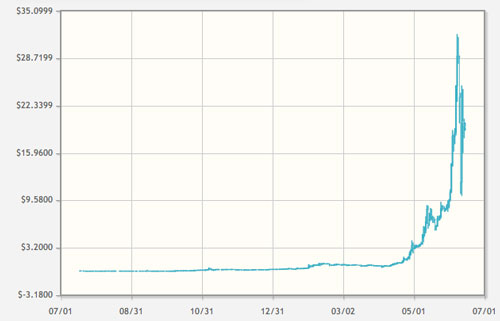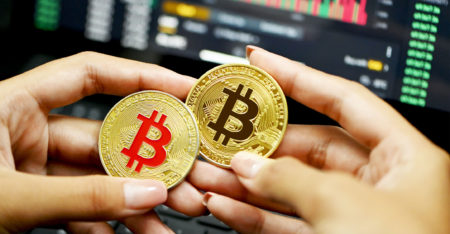
All currencies are based on trust. In the days of the gold standard, that meant trusting that paper money was backed by bullion in a reserve. Centralisation was necessary in order to prevent counterfeiting and ensure money wasn’t simply printed on a whim.
Of course, experience has shown that centralisation isn’t failsafe. Hence, economists have long theorised about the possibility of a decentralised currency. Bitcoin may be the currency they’ve been waiting for.
Bitcoin was created in 2009 by a programmer known as Satoshi Nakomoto (no doubt a pseudonym) and describes itself as a decentralised digital currency. It’s an open peer-to-peer currency, so there is no central issuing authority — a distributed network collectively manages both new money entering the market and all transactions within it.
Because a central authority doesn’t control “Bitcoins”, they can’t be artificially inflated or deflated. The network controls the rate at which Bitcoins are created, cryptography means only the owner of any given Bitcoin can spend it, and the network’s record of every transaction ensures that users cannot duplicate their Bitcoins or spend them more than once.
This system of recording transactions is called the “blockchain”. It verifies all transactions and performs the necessary encryption on the network via the processing power of individual peer’s processors and graphics cards. This process is called “mining”, and miners are rewarded with Bitcoins for letting the network utilise their machines’ processing power through a complicated algorithm-based allocation system.
Being a peer-to-peer network with no central network server — similar to other peer-to-peer networks like BitTorrent — the Bitcoin network can’t be shut down. As a result, some have dubbed it the “Napster of banking”.
Also, there are no middlemen as there are in traditional banking — anyone with a digital Bitcoin wallet (another requirement for those looking to accept or trade in the currency) can pay anyone else with one, directly. Bitcoins can be split to eight decimal points, which also makes them far more flexible than traditional currencies.
The question is: can you actually use them like cash? The short answer is yes. Users can earn Bitcoins by mining, or by accepting them as payment for goods and services. Similarly, Bitcoins can be spent on goods or services with vendors who accept them, or sold for traditional currency to those who want them on open markets like Mt Gox.
Bitcoin transactions are deliberately irreversible — like cash, they can be given back to you, but you can’t reverse a Bitcoin transaction like you can a card transaction.

Bitcoin is a finite currency because, by design, the system will only ever allow for the creation of 21m BTC (Bitcoin’s equivalent of USD or ZAR) of which approximately 6,5m — worth around US$100m at the rate of around $16,80 to BTC1 – are currently in circulation.
The supply of Bitcoins increases at a declining rate (for example, the supply increases by 50% in the second year, 30% in the third, and so on), so one of the worries is that the sudden boom in media coverage will result in greater demand than supply, and thus deflation – even if the people behind Bitcoin would have you believe it’s inflation and deflation proof.
Also, there are concerns that a very small part of the Bitcoin economy’s activity comes from users actually using Bitcoins. It seems many people are mining Bitcoins — with some even building dedicated, custom, electricity-devouring mining machines — and promptly sitting on them, hoping their value will increase massively so that they can sell them for a sizeable profit (minus their electricity costs, of course).
One of the few sites seeing lively Bitcoin trade is online marketplace Silk Road. Silk Road is a digital black market for drugs, complete with an Amazon or eBay-style feedback system for buyers and sellers. One can’t, however, simply log on. To get to Silk Road you have to use the TOR network, which essentially hides your IP address making you digitally anonymous and thus making it almost impossible for anyone, like say pesky law enforcement officers, to track you down.
However, those looking to use Bitcoins on sites like Silk Road should remember that all Bitcoin transactions are recorded and that a sufficiently motivated party with the requisite forensic computing skills could trace the transaction’s source.
Silk Road is only one example of the possibilities afforded by a digital currency like Bitcoin and, understandably, it’s one that has been getting a hard time from conservatives and Bitcoin users alike. Many users don’t want the currency seen as nothing more than tokens for black-market trade.
Currently, one of the greatest obstacles facing Bitcoin is its complexity. Setting up a digital wallet isn’t overly complicated, but ensuring it’s suitably secure and backed up is more so. Actually mining Bitcoins, meanwhile, is tricky for the moderately technologically savvy, and probably nearly impossible for those who think Napster is some sort of sleeping pill.
However, many now widespread technologies started off complicated and gradually became simpler. Remember how limited sites like Blogger or WordPress were in their early days, and thus how few blogs there were? Nevertheless, there was clearly a market for sites that made blogging easy, and now there are millions of blogs.
Similarly, there’s certainly a demand for simpler, lower-cost banking services that aren’t subject to political borders, state interference, or reserve bank whims. Bitcoin may not prove to be the answer; it may instead prove to be the forerunner of the answer in much the same way that Napster was a precursor for services like BitTorrent.
From a government and regulatory perspective, Bitcoin is terrifying. If governments aren’t privy to individual’s personal economies, they can’t tax, collect debts, seize assets or otherwise interfere with individuals’ finances. For libertarians, anarchists and their ilk, that’s an incredibly exciting prospect.
The most important thing for Bitcoin users to remember, and for newcomers to learn, is that the weakest point in the network is your digital wallet. It’s your responsibility to keep it secure, encrypted and backed up. If you lose access to it, your Bitcoins are gone forever. If you fail to protect it sufficiently, your Bitcoins could get stolen like this guy’s did.
Mike Schussler of Economists.co.za says a currency is “only what people believe it is”.
“For a while, people used seashells, then coins, then paper money, and now, increasingly, electronic numbers,” he says. “The only rule with currency is that people have to trust it. If they do, it works. Any currency is only meaningful if you can exchange it for tangible goods or services.”
Bitcoin can be exchanged for goods and services, but whether or not it will manage to tick the requisite trust box remains to be seen. For now, it isn’t for the fainthearted or technologically challenged.
Some argue it’s going to change the world, others argue it’s going to die with a whimper and a blood-curdling howl from heavily invested users. Either way, it’s an intriguing concept and one that technophiles and economists alike are going to be watching closely. — Craig Wilson, TechCentral
- Subscribe to our free daily newsletter
- Follow us on Twitter or on Facebook




